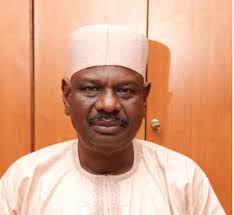Admin.
The Managing Director of the Transmission Company of Nigeria (TCN) Engr. Abdul-Aziz Sule has cleared the air on certain operational procedures of the transmission company. He spoke on Thursday, May 16, 2024, in his office, while hosting a group of Civil Society Organizations, the Arewa Youth Alliance for Progress and Development and Nigeria Citizens Watch for Good Governance, that paid him a courtesy call. The leaders of the coalition from Kaduna and Lagos states respectively, Alhaji Aliyu Muhammed and Comrade James Ishaku, sort to know why the Niger Republic, a neighboring country has a regular power supply while the country supplying the light, which is Nigeria, does not; they also sort to know the actual role played by TCN in all of this matter.
Replying, the managing director who is strictly professional in his approach to duties, thanked them for the visit and praised them for showing maturity in the face of myriads of other problems. He admonished them to be ambassadors of TCN and to go out there and educate the rest of their colleagues on the true situation. “TCN is a government company, unlike the GENCOS and DISCOS that are private”, he began; “So everything we do here is to improve the lot of Nigerians; we owe them that responsibility: but for now, ignorance rules the sector”, he declared. Then, looking around his office, he took a deep breath and answered the Niger Republic question. “Gentlemen, there are few African countries that can be compared to Nigeria; Niger republic itself is not bigger than Kano –a state in Nigeria”, he said. “What happens is that the River Niger runs through that republic which is our main source of water supply to the Kainji Dam; if Niger constructs a Dam, our source of water supply will be cut off; so we have to supply them with electricity which they pay for anyway”, he said, pointing out that for that reason, it was necessary to meet their electricity needs in exchange for that gesture.
On the bigger question of the role of TCN, Engr. Abdul-Aziz Sule took another deep breath and answered. “TCN neither generates nor distributes electricity; our job is to transmit”, he answered, adding that the tendency is for members of the public to believe TCN is responsible for everything. “I am a committed patriot having grown up from the ranks. It is from TCN I got married and have my children; so I always put in my best at all times”, said Abdul-Aziz reminding his audience that he once worked in Kaura Namoda in the heart of Zamfara inside the bush for weeks trying to bring electricity to that town showing the level of his commitment. “When it comes to ensuring regular electricity supply to Nigerians, you can count on me”, he said, stressing that TCN that the TCN of today is professionally driven and competent to meet the needs of Nigerians. Nevertheless, he told the CSOs that TCN transmits only what is generated and as much as possible ensures stability. “As managing director, I can’t remember when I had a good sleep”, he disclosed. “Yet, I sit here and I get strange letters from amorphous organizations requesting for even what normal and recognized government agencies cannot”, he lamented. Abdul-Aziz who is a first-class Electrical Engineering material from a grade A university however called for cooperation in moving the power sector forward. “We can do more with the cooperation of all stakeholders involved, not just the TCN management”, he said.
On security, he told his audience that TCN spends a lot in several states of the federation to secure vital installations. “We used to work with the Nigerian Security and Civil Defense Corps alone; now we have involved members of the community to help in protecting these installations”. “This is a big problem; and we have to put in extra hours of work to halt the menace; you know what it means, you are at home in the dead of the night and you are told of outbreak of fire in one of the transmission lines!” Sitting firmly, Abdul-aziz described the fire incident that broke out in Birnin Kebbi in the heart of darkness and how before 6 am he was up and on his way to inspect the damage. “You can imagine what was going on in my mind; don’t forget that the budget has already been passed and now, you have an emergency situation—not budgeted for-to deal wirh”. On adequate funding, he told his visitors to go and find out what the yearly budget of Ministry of Power is. “What we get is sometimes not enough to buy one transformer”, he disclosed, wishing that the CSO’s could help persuade NASS to do more in that sector.” There is a lot to be done; we need money to fix repairs, for logistics, tackle emergency matters and also monitor our installations; we could have done more with budgetary increase”, he stated stressing that engineering is not a lazy man’s job!
Moving further, Engr. Abdul-Aziz emphasized that if 500 billion naira is given to the electricity sector yearly the hi-cups experienced would have been eliminated “With the little I have, I believe that I have impacted on staff welfare, training, and personally I am itching to do more—to help the administration succeed”, he said. On the worrisome issue of “system collapse”, Engr. Abdul-Aziz corrected the wrong impression, explaining that “system collapse” was actually “system disturbance”. “Our system has protection and if something happens, the protector switches off on its own; that is what is called system collapse”. Throwing more light, he said, one incident alone can bring down a Tower which in turn drags others down. Specifically, he said the problem of the Northeast was largely that of vandals and insurgency. “We visited a site deep in the Northeast and not quite five minutes after we left, a bomb exploded in that very spot!”, he said, wondering what could have been their fate!
At this point, his visitors were already rooted to their seats, a faraway expression in their eyes, staring at Abdul-Aziz as he spoke. Apparently at home in his territory, Abdul-Aziz went on regaling them with the technicalities, the A and B of electricity matters in Nigeria before soliciting the support of the Northeast governors to get things right in that region. “We need everyone on board to get this thing done”, he stated.
Dazzled by the revelations, the leaders of the Civil Society Organizations while pledging to go back and educate their people on the intricacies of electricity supply, admitted that members of the public are unaware of the administrative bottlenecks; they agreed that NASS ought to do more in their oversight functions to help the power sector grow instead of being the reverse. They also solicited the support of their fellow CSOs to join hands and help the management succeed. They gave kudos to the TCN boss for his enduring tenacity and commitment to ensuring that President Bola Ahmed Tinubu’s Renewed Hope Agenda is a resounding success




Comments are closed.